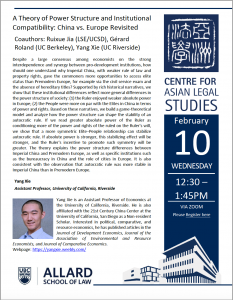A Theory of Power Structure and Institutional Compatibility: China vs. Europe Revisited
Coauthors: Ruixue Jia (LSE/UCSD), Gérard Roland (UC Berkeley), Yang Xie (UC Riverside)
Event Details:
Wednesday, February 10, 12:30 to 1:45PM [PST] via zoom
Guest Speaker: Yang Xie (UC Riverside)
Registration: https://bit.ly/3jcN0Fj
Event Description:
Despite a large consensus among economists on the strong interdependence and synergy between pro-development institutions, how should one understand why Imperial China, with weaker rule of law and property rights, gave the commoners more opportunities to access elite status than Premodern Europe, for example via the civil service exam and the absence of hereditary titles? Supported by rich historical narratives, we show that these institutional differences reflect more general differences in the power structure of society: (1) the Ruler enjoyed weaker absolute power in Europe; (2) the People were more on par with the Elites in China in terms of power and rights. Based on these narratives, we build a game-theoretical model and analyze how the power structure can shape the stability of an autocratic rule.
Speaker Bio, Yang Xie (Assistant Professor at UC Riverside):
Yang Xie is an Assistant Professor of Economics at the University of California, Riverside. He is also affiliated with the 21st Century China Center at the University of California, San Diego as a Non-resident Scholar. Interested in political, comparative, and resource economics, he has published articles in the Journal of Development Economics, Journal of the Association of Environmental and Resource Economists, and Journal of Comparative Economics.
Full Event Poster
